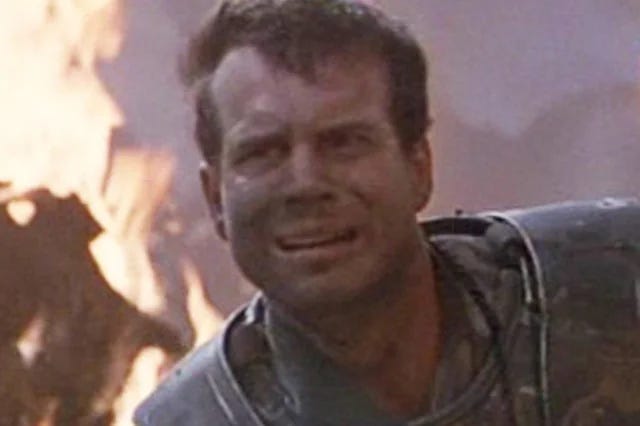“Game Over!”: Bill Paxton Models Complying In Advance
Performative despair encourages the xenomorphs to eat your face
Perhaps the most famous and meme-able moment in James Cameron’s Aliens belongs to the charismatic ball of goof that is Bill Paxton.
In the movie, a bunch of space marines have landed on a distant planet in response to a distress signal. The planet, it turns out, is overrun with vicious predatory aliens (aka xenomorphs) with acid for blood and lots and lots of teeth. The aliens kill lots of people, and one of the survivors, Paxton’s Private Hudson is barely holding it together; he teeters on the sweaty verge of panic as the aliens close in. When the human’s transport off the overrun planet is destroyed, Hudson loses it completely.
“That’s it man!” he wails, voice breaking into a squeaky falsetto. “Game over, man! It’s game over!”
—
Just a reminder that posts like this are made possible by contributions from you. I can’t write without your support. So if you find my work valuable, consider becoming a subscriber. There’s a sale today; it’s 40% off, $30/year.
—
Paxton’s terror is relatable and understandable; things look bleak for our intrepid heroes. His particular expression of despair is also telling. He doesn’t say, “We’re all going to die!” in the future. Instead he says, “Game over!” as if this is already the future and he’s already dead. He imagines that the game, the movie, the life, is done. By imagining that he’s fast forwarded to the end, he is trying to escape the moments leading up to that end. “Game over!” isn’t a warning; it’s a kind of prayer. If the game is over, you don’t have to keep playing.
After Trump’s victory, a lot of people are despairing, and for good reason. Trump has promised policies which will, if implemented, lead to genocidal violence, economic collapse, and the gutting of democracy. The steady drip, drip, drip of new unqualified cabinet appointments and ugly policy details is not unlike watching more and more salivating xenomorphs creep out of the shadows while your exit route is cut off.
And sure enough, some people post election are reacting somewhat like Paxton. Journalist Dave Troy, for example, keeps posting dire warnings about the coming nightmare. “It’s the Musk administration,” he intoned. “People need to understand that—and they soon will. You have no idea what’s coming.”
The phrasing isn’t as memorable as Paxton’s, obviously. But I think the impulse is similar. The future is framed as a disaster, which is so inevitable that it’s essentially already here. Resistance is futile because the unimaginably horrible doom is occurring right now. The xenomorph is consuming you as you speak.
Again, Paxton’s reactions (and Troy’s) are understandable. But, as the film’s hero Ripley (Sigourney Weaver) makes clear with her eye-rolling reaction, they're not helpful. When you insist that the game is over, you stop trying to win. Paxton is so afraid of the grim task of trying to survive that he wishes for death—essentially taking the side of the xenomorphs.
Siding with the enemy emotionally, arguing that their victory is inevitable and their power unimaginable (“You have no idea…”) is a kind of desperate, last ditch empowerment fantasy. Paxton and Troy present their fears as a kind of cynical, rational realism—they know what is going to happen, and are refuting in advance any pie in the sky optimism. But no one in fact knows the future, and the hyperbolic claim to absolute knowledge isn’t rationalism or realism. It’s a fearful effort to exert control. Insisting the worst will happen is a way to claim a kind of power over one’s own anxiety and fate. You can’t resist the xenomorph, but you can talk up their mightiness and in that way transform yourself from the victim to aggressor. Troy says you have no idea what’s coming, but he does, which makes him tough, strong, knowledgeable—empowered.
Screaming that the xenomorphs have won is also a kind of complying in advance. Tim Snyder uses “complying in advance” to refer to people like Jeff Bezos, who rush to placate fascists before said fascists get into power or before they can fully enforce their will. But I think “complying in advance” also applies to Paxton, who is essentially disarming himself because the prospect of resistance is too terrifying. A mix of terror and faux canny assessment can lead to helping the fascist kill others, or to baring your neck so the xenomorph can dispatch you quicker. It doesn’t make much difference as far as the monster is concerned.
I’m not saying that people aren’t allowed to express fear or anxiety about what’s coming; there’s nothing especially antifascist about enforced optimism or unreflecting chipperness. Ripley doesn’t tell everyone that the xenomorphs won’t eat their faces. But she doesn’t pretend they’re already dead either. She points out that Newt (Carrie Henn), a child, has survived, crawling through vents and staying one step ahead of the teeth. The good guys can fight; they can hide, they can keep going.
Hope can mean figuring out how to survive for the next moment, and then the next. It can mean reminding yourself, and others, that the game isn’t over until it’s actually over. The xenomorph with the weird orange makeup hasn’t won yet; don’t help him by pretending he has.



Thanks for this. Re: Dave Troy, I discovered him late. His writing delivers well-earned frissons on the one hand. On the other, I was more impressed by Joseph O'Neill's post-election interview in the NY Review of Books. He said, with a courage I admire:
"Harris lost, yes—but let’s not overegg the pudding. Trump’s margin of victory was humdrum. His final vote tally will fall millions short of the votes won by Biden in 2020. The opposition to him is huge and intense and in the right."
I'll stop there.
Thank you for providing this important reminder. Complying in advance takes many forms.